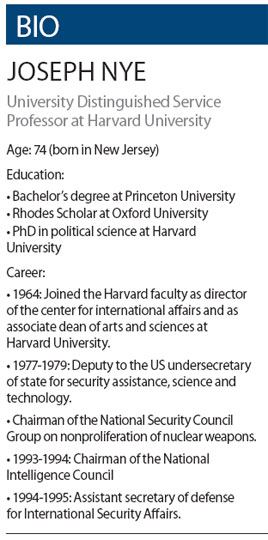Not a zero-sum game
Updated: 2011-10-21 09:12
By Ariel Tung (China Daily)
|
|||||||||
|
Joseph Nye says that China and the US have to work together when dealing with many issues such as financial stability and climate change. Ariel Tung / China Daily |
US foreign policy stalwart Joseph Nye says China's rise does not mean the US will decline
The 21st century has witnessed China's rise as an economic power as it overtook Japan as the world's second-largest economy; and Goldman Sachs has projected that China will surpass the United States' gross domestic product (GDP) in less than 20 years.
But what many term "China's era is not yet upon us", Joseph S. Nye, one of the most influential scholars on American foreign policy, tells China Daily in his Harvard University office.
"I don't think the 21st century is going to be anybody's era. I think there are going to be many problems in this century which will require cooperation between the US and China," says Nye, who is currently University Distinguished Service Professor at Harvard and author of The Future of Power.
Nye has served as assistant secretary of defense for International Security Affairs, chair of the National Intelligence Council, and deputy to the US undersecretary of state for security assistance, science and technology. He also coined the phrase "soft power" in a 1990 book, Bound to Lead: The Changing Nature of American Power; and expanded on the concept in his 2004 book, Soft Power: The Means to Success in World Politics.
Although there have been some "difficulties" in the relationship between China and the US, Nye says he is optimistic that the two will eventually resolve them.
 |
"And many issues like financial stability and combating climate change can only be accomplished by working with others. I think the US and China probably will have to work together if they want to get the outcomes they want."
According to Nye, the often talked-about power transition from West to East, or "the Rise of Asia" in the 20th century is actually "the Return of Asia", which began with Japan, then South Korea, Singapore and Malaysia, and now China and India.
"If you look at Asia before the Industrial Revolution, Asia was half of the world's population and more than half of the world's economy. And then, the Industrial Revolution occurred in Europe and North America; and Asia, by 1900, only accounted for 20 percent of the world's economy.
"And what we're seeing today - in this century - is that Asia will return to its historical proportions, that is, half of the world's population and economy by 2050."
However, it is wrong to project the rise of China as the decline of the US, he says. First, one's success doesn't have to be at the cost of another. Second, the US is not in absolute decline.
"The US is still a very vibrant society and economy. There is some relative decline, but you can also call that the rise of the BRIC (Brazil, Russia, India and China).
"That doesn't mean the other countries will necessarily surpass the US, although the gap between these countries and the US will narrow."
While there has been speculation that China will overtake the US in the next few decades, Nye says that it is an "oversimplified view". China will still lag behind the US in economic or military power (also called hard power) in many years to come.
"Very often people project the current situation into the future without realizing that history sometimes is not always linear. In the last two years where China has grown at 10 percent, and the US has grown at less than 2 percent, people say this shows China will overtake the United States."
Even if Goldman Sachs' prediction that China will surpass the US' GDP by 2027 comes to fruition, the two economies would be equivalent in size but not in composition. According to Nye, it's a big mistake to make overall GDP a measure of whether a country is more powerful than the other.
"China will have a larger economy than the United States simply because it is a larger country. But it won't have a more sophisticated economy which you measure by per capita income."
There is no doubt China has been able to lift several hundred million people out of poverty and to develop a vibrant economy, but the country will face a new set of challenges, says Nye.
"I think China's rate of growth is likely to slow down because as countries get richer, the growth rate always slows down. Also, there may be some slowing down because of demographics. A famous Chinese saying is 'we may grow old before we grow rich'," says Nye.
The truth is, no one, not even the Chinese leaders, know whether China will successfully come up with a formula to manage an expanding urban middle class, regional inequality and the migration of rural workers, according to Nye.
On the other hand, overestimating China's economic and military power is dangerous as it creates a kind of fear that will jeopardize China-US relations.
"I don't think that China will take over the US or threaten the US, but one of the things we have to worry about is fear. Sometimes when people have too much fear, they react badly."
Nye says former leader Deng Xiaoping's advice to "keep a low profile" is highly appropriate as China gains in economic and military strength.
"Should China keep a low profile and also develop its soft power, the rise of China's economic and military strength won't be so alarming to other countries. So I think that was wise advice."
In 1974, Deng told the UN General Assembly that China was not a superpower, nor would it ever seek to be one. Nye says Deng's statement is still correct today.
"China's economy has grown impressively but China is not a military superpower, even with the large amount of investment in its military budget over the last 10 years. China is not going to equal the US' military strength at the global level for decades to come."
If China is successful in its 12th Five-Year Plan (2011-2015) to move onto greater domestic consumption, that would spell good news for all, Nye says. "If China would consume more, which means it will depend less on its export industries, there will be more production for Chinese consumers. That will be good for Chinese consumers (who will become richer) and also for the world's economy."
However, China has a lot to catch up on in terms of its soft power, Nye says, explaining that soft power is the ability to influence others through diplomacy, culture and history.












